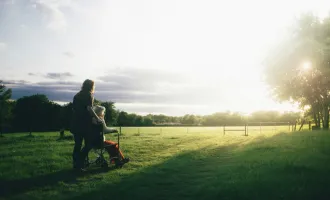
COVID Booster Briefer
There’s a new COVID booster shot out there. I sat down with Dr. Joshua Adler, Executive Vice President for Physician Services at UCSF Health, to get the facts.
When should we get the new booster shot? What if we recently had COVID?
It’s recommended to get the shot at least two months after your last booster shot. If you’re like me and the many others who COVID finally caught this past year, you are safe to, and should, get the new booster. It’s safest to get the booster once your symptoms have fully resolved.
Having been infected with virus is presumed to offer a period of enhanced protection that may last between 3 to 6 months. With that in mind, it’s best to get the booster no more than 6 months after being infected.
There’s also a flu vaccine out there. How should we balance getting both?
There’s no data to suggest that the flu shot and the COVID booster need to be timed around each other. If it’s easier for you to get them on separate days, go for it. If you can get them at the same time, great!
How should we time it with getting the flu vaccine?
- Everyone should get the flu vaccine!
- If it’s easier for you to get them at the same time, do it!
- If it’s easier separately, do that
- People are predicted a big one so get one!
Is everyone eligible for this booster?
- Not everyone, not young children (12 is the cut-off)
- Eventually an approval
What’s special about this booster? How does this vaccine stand up against the most recent variants of SARS-CoV-2?
- Specifically designed with omicron in mind
- Prior vaccine developed before omicron existed, minimal ability to protect against omicron with these vaccines (did protect against severe disease)
- New bivalent vaccine, reduce the risk of getting omicron
- Not as much efficacy data on this new bivalent booster
- Basically the same vaccine with tweaked RNA sequence to get the right new shape of the omicron spike protein
Should we mix and match companies?
- No data either way, up to individual
- Theory that mix and match creates more diverse antibody response has not data behind it
How are people reacting to the second booster? Similar or better/worse than prior vaccinations?
- Still getting people knocked on their butts by the booster, no difference from other boosters
Where else can I get my booster if not through UCSF?
- Community pharmacies, many of them have vaccine and it’s very convenient
Any other advice?
- Early surge of people wishing to get booster and now it’s tapered off
- No more sense of urgency and that’s okay
- Seems enthusiasm is lower than perhaps vaccines that have preceded
- Still encouraging people to get the vaccine
- Likely this vaccine will be included in what is mandatory for the University of California, since it recommends all vaccines recommended by the CDC… no formalization
When do you think the next booster will be?
- The test is will we have a modest-substantial fall/winter surge
- If yes, a new variant can appear and that means will need a new booster (trivalent, this one is bivalent)
- If no, maybe there will less impetus for more vaccine
- Will be an interesting test for the western world
- Summer was an example: tons of people got omicron



